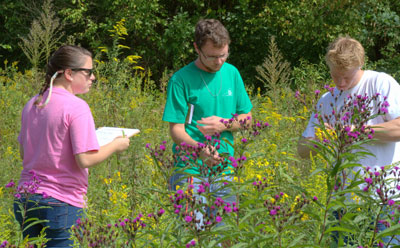
You don’t always need to be a botanist or zoologist to contribute to science. Thanks to Longwood University’s participation in a statewide effort, anyone can play the role of scientific observer this Saturday.
Longwood’s Lancer Park is one of 12 sites that will be "under the microscope" during Virginia BioBlitz 2016, when teams of volunteers will work together to find and identify as many species of plants, animals, fungi and other organisms as possible in one day. The event, set for Saturday, April 23, from 9 a.m. to 2 p.m., is open to everyone in the Longwood and Farmville communities.
"If you want to catch some salamanders and hold them in your hands, show up. This is going to be fun," said Dr. Sujan Henkanaththegedara, a Longwood biology professor who is one of the organizers. "This is a family event and a community event."
Virginia BioBlitz, sponsored principally by the Virginia Geographic Alliance, seeks to demonstrate the importance of conservation and exploration, highlight the biodiversity of an area and generate data that can be used by scientists and citizen scientists. It’s part of a national effort related to Earth Day, which this year is April 22.
The Environmental Educational Center at Lancer Park will be "BioBlitz central," said Henkanaththegedara. At "touch tables," people can handle local plants, and materials for teachers will be available. Two sessions are scheduled: one beginning about 9:15 a.m., and the other about 12:15 p.m.
Participants are encouraged to download the iNaturalist app [available on Google Play for Android and the Appstore for Mac] to their phones or tablets before arrival. The app will be used to record observations after participants are assigned to various specialty groups led by faculty members from Longwood’s Department of Biological and Environmental Sciences. They will work in the area behind the Environmental Education Center, which includes wooded areas, grassy meadows and several ponds, with access to Buffalo Creek and the Appomattox River.
"If you want to catch some salamanders and hold them in your hands . . . this is going to be fun."
Dr. Sujan Henkanaththegedara
"There is a surprising amount of biodiversity at Lancer Park," said Henkanaththegedara. "My students and I have found far more species than you would typically expect in an urban habitat, including three species of crayfish, 10 to 12 species of amphibians, turtles, tons of birds and butterflies, and local plants. We’re fortunate to have this natural laboratory."
One of the event’s key goals is igniting a sense of exploration, said Dr. Ed Kinman, a geography professor who is another organizer of the event.
"We want our students to become more astute observers of the world around them, to look at it more carefully," said Kinman, state co-coordinator of the Virginia Geographic Alliance, which is affiliated with the National Geographic Society. "Because of cell phones, many have lost that ability. It’s almost like we have to rediscover our world. This will be educational in many ways but also fun."
Though it’s not necessary, people may register for the event by visiting here. An orientation/information session on the Longwood event, also not necessary, will be held Thursday, April 21, at 5:30 p.m. in Chichester G12. More information is available here.
Longwood organizers hope to see the university’s participation in Virginia BioBlitz become an annual outreach. Nine state parks and two national wildlife refuges comprise this year’s other sites.
"This is an excellent example of what I call becoming citizen scientists," said Henkanaththegedara. "When you’re out in the field, it’s easier to see connections in the natural world. Plus, students in my ichthyology [study of fish] and general ecology classes have documented biodiversity, and they are more motivated when they use data they have collected. It gives them a sense of ownership of the data."

